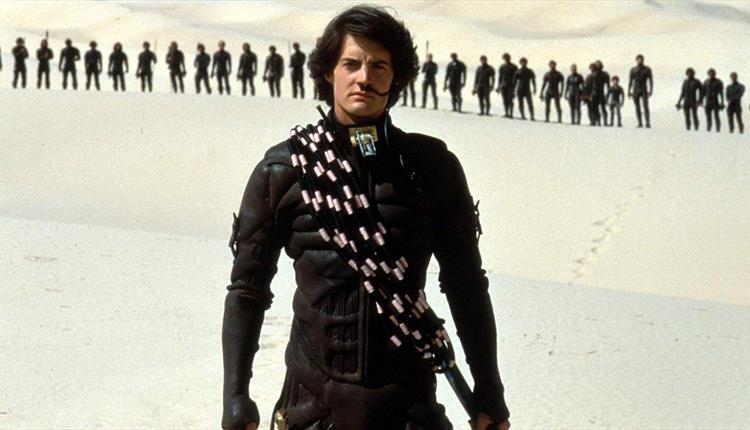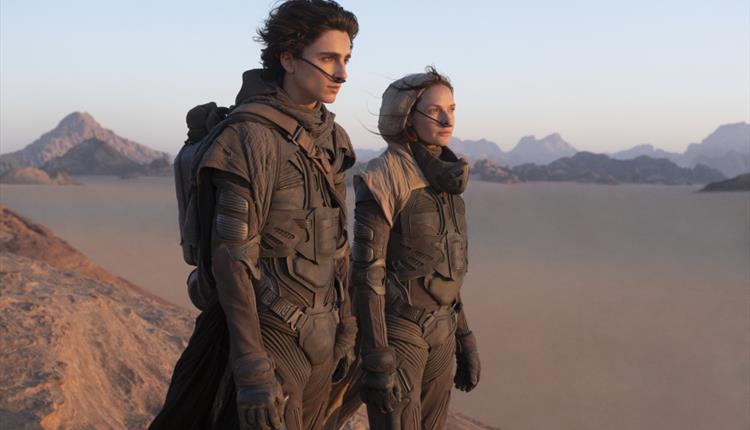Dune Part 1 – A visual marvel that delivers on its promises and improves upon Villeneuve’s previous work
By jasonfox

Written by Jacob Marshall and Jason Fox.
“This is only the beginning”
Timothée Chalamet shines through an all-star cast in this gargantuan sci-fi epic.
Dune is an example of modern science fiction filmmaking at its finest, a visual tour de force that utilises its giant budget to maximum potential. In what is easily director Denis Villeneuve’s most ambitious film yet, he succeeds in constructing several vivid and believable worlds in this breath-taking epic. The film is a faithful and convincing adaptation of Frank Herbert’s novel and an excellent piece of sci-fi, promising much and delivering where other blockbusters have failed.
Dune follows young protagonist Paul Atreides (Timothee Chalamet), the son of the powerful galactic Duke Leto (Oscar Isaac) as his family is granted control of the wealthy yet volatile desert planet of Arrakis. The planet, home to mysterious people, an ethereal resource, and enormous, ship-eating worms, gives the film its title.
From here, audiences observe both Paul’s inner turmoils and strange dreams as well as the political negotiations and conflicts involved in acquiring the “desert power” of the land. Central to the plot is the conflict between ruling dynasties. Constantly under threat from the former occupants of the land, the repulsive and violent House Harkonnen, Arrakis becomes the home of political deception and monstrous barbarity. When House Atreides is betrayed by one of its own, the Harkonnen hoards storm their palace and force Paul to flee into the desert to seek aid from the unknown Fremen people who live amidst the dunes.
The core of Dune’s appeal lies in visual spectacle. It takes a lot for a film to be able to stand on just that, but the visual aspect is so impressive that it manages. There are some shots, mostly of star ships in orbit, that are truly breath-taking to behold. It manages to effortlessly balance these gorgeous visualisations with a degree of real purpose, legacy, and impending threat.
Everything about the world of the film feels meticulously constructed with a great deal of thought put into it. This is ultimately what allows the film to succeed. This does, however, point to one of the film’s problems. Although it is undeniably a visual spectacle, it lacks some of the artistic flair or strangeness that could be found in the original novel.
An obvious point of comparison is David Lynch’s 1984 adaption. Slated for its sloppy editing, poor storyline, and bafflingly ridiculous moments, one of its saving graces was its iconic design. The look of characters and sets is simply incredible and stands the test of time as a piece of art not just as an aesthetic backdrop. Although the Lynch version is undeniably the weaker adaptation, it does give the story a certain amount of character, more alternative and shocking than the conventional set pieces of Villeneuve’s film. Although impressive on the big screen, it remains to be seen whether this new adaptation will be as visually striking and as noticeably fantastical as its predecessor in 20 years’ time.
Dune succeeds in its more touching, quiet moments. Scenes between Paul and his mentor Duncan (Jason Momoa), and the reassuring relationship with his father reveal a distinctly human quality behind this epic which is as valuable as its impressive action sequences. The relationship between Paul and his mother (Rebecca Ferguson) in particular foregrounds the crucial tensions and strains in the world of the film, as one tries to facilitate the other’s premature coming of age. The mental grapple between the two, most notably Ferguson’s rigorous training so that Paul can use his almost superhuman powers, drives much of the story.

This film would not be what it is without strong performances from all involved. Timothee Chalamet, whose casting was a source of scepticism for me, puts on a workman-like effort and does a good job with the script he is given, showing his versatility and range. Oscar Isaac and Rebecca Ferguson are particularly convincing. Ferguson in particular gives probably the most emotive performance from anyone involved. We can only hope that Zendaya and Dave Bautista, who have barely five minutes of screen time between them, are developed further in the now-confirmed sequel.
However, the main problem here is with the writing. Although the dialogue certainly doesn’t do a disservice to the characters, it prevents them from appearing convincingly human, leading in some cases to flat delivery almost by design. As well put together as it is, it is emotionally cold and never breaks away from its formulaic structure. This certainly doesn’t stop it from being a good film, but it holds the film back somewhat and prevents it from being exceptional.
The score, courtesy of Hans Zimmer, is proudly glorious, helping to convince the viewer that something extraordinary is unfolding before them. The royal fanfares and not quite human synths keep the audience tense and curious. Music plays a significant role every time the main antagonist The Baron (Stellan Skarsgard) takes the screen with his enormous, rhino-esque build, rumbling egotism, and unhinged fantasies. Definitely a more intimidating depiction than Lynch’s bubbling lunatic.

Despite running for more than a heavy two and a half hours, Dune never overstays its welcome or allows the audience to become bored. Owing to a combination of well-choreographed action and ever-changing scenery it is a joy simply to be immersed in the world Villeneuve creates. An exceptionally well-made sci-fi film that will resonate with casual moviegoers, cinephiles, and hardcore fans of the genre. As impressive a technical undertaking as it is, it is dragged down by adhering too much to a formulaic structure and never moving beyond it. The result is a very good film that never quite manages to be great.
Dune ends just as its giant cogs are set into motion; much like Paul himself, it is clear to the audience that this film is destined to be the start of something astonishing.
4/5.







